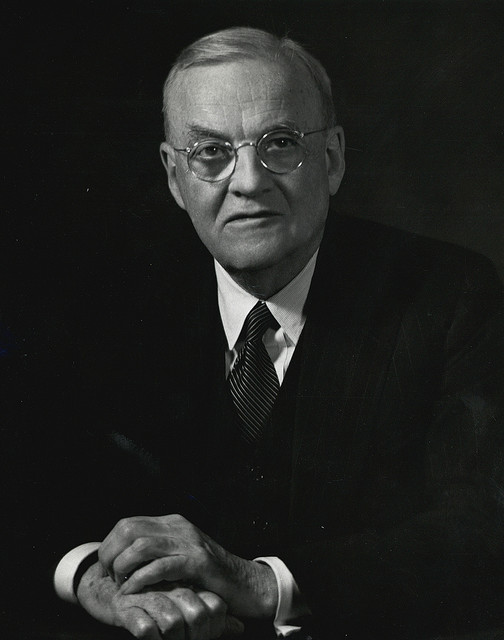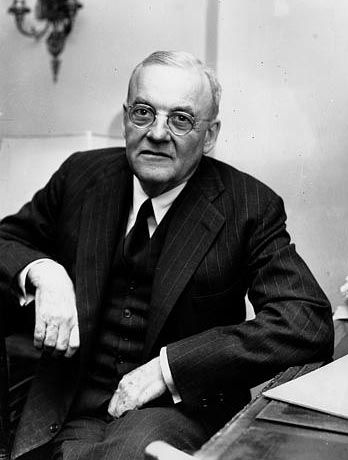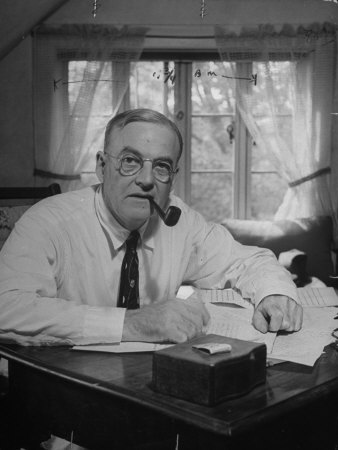<Back to Index>
- 52nd United States Secretary of State John Foster Dulles, 1888
PAGE SPONSOR



John Foster Dulles (February 25, 1888 – May 24, 1959) served as U.S. Secretary of State under President Dwight D. Eisenhower from 1953 to 1959. He was a significant figure in the early Cold War era, advocating an aggressive stance against communism throughout the world. He advocated support of the French in their war against the Viet Minh in Indochina and it is widely believed that he refused to shake the hand of Zhou Enlai at the Geneva Conference in 1954. He also played a major role in the Central Intelligence Agency operation to overthrow the democratic Mossadegh government of Iran in 1953 (Operation Ajax) and the democratic Arbenz government of Guatemala in 1954 (Operation PBSUCCESS).
Born in Washington, D.C., he was one of five children and the eldest son born to Presbyterian minister Allen Macy Dulles and his wife Edith (Foster). His paternal grandfather, John Welsh Dulles, had been a Presbyterian missionary in India. He attended public schools in Watertown, New York. After graduating from Princeton University (Phi Beta Kappa, 1908), where he competed on the American Whig - Cliosophic Society debate team, and graduating from The George Washington University Law School, he joined the New York City law firm of Sullivan & Cromwell, where he specialized in International Law. He tried to join the United States Army during World War I but was rejected because of poor eyesight. Instead, Dulles received an Army commission as Major on the War Industries Board.
Both his grandfather, John W. Foster, and his uncle, Robert Lansing, had served as Secretary of State. He was also the older brother of Allen Welsh Dulles, Director of Central Intelligence under President Eisenhower, and of Eleanor Lansing Dulles who is most notable for her efforts in the economic rebuilding of post war Europe during 20 years of employment with the State Department.
On June 26, 1912, he married Janet Avery, with whom he had two sons and a daughter. One of their sons, Avery Dulles (1918 – 2008), converted to Roman Catholicism, entered the Jesuit order and became the first American priest to be directly appointed a Cardinal. His other son, John W. F. Dulles (1913 – 2008), was a Brazilianist and professor of History at the University of Texas at Austin. His daughter, Lillias Hinshaw (1914 – 1987), was a Presbyterian minister.
In 1918, Woodrow Wilson appointed Dulles as legal counsel to the United States delegation to the Versailles Peace Conference where he served under his uncle, Robert Lansing, then Secretary of State. Dulles made an early impression as a junior diplomat by clearly and forcefully arguing against imposing crushing reparations on Germany. Afterwards, he served as a member of the War Reparations Committee at the request of President Wilson. Dulles, a deeply religious man, attended numerous international conferences of churchmen during the 1920s and 1930s. In 1924, he was the defense counsel in the church trial of Rev. Harry Emerson Fosdick, who had been charged with heresy by opponents in the denomination, a case settled when Fosdick, a liberal Baptist, resigned his pulpit in the Presbyterian Church, which he had never joined. Dulles also became a partner at Sullivan & Cromwell, an International Law firm.
Following Adolf Hitler's appointment as Reichskanzler in 1933, Dulles oversaw the direction of investment worth more than $1 billion in businesses in Nazi Germany. According to Stephen Kinzer's 2006 book Overthrow, Dulles' firm benefited directly from doing business with the Nazi regime. In addition, throughout 1934 Dulles was a very public supporter of Hitler. However, the junior partners, led by his brother Allen, were appalled by the firm's Nazi connections and threatened to revolt if Dulles did not end them. In 1935, Dulles closed Sullivan & Cromwell's Berlin office; later he would cite the closing date as 1934, no doubt in an effort to clear his reputation by shortening his involvement with Nazi Germany.
Dulles was a close associate of Thomas E. Dewey, who became the presidential candidate of the Republican Party in the 1944 election and 1948. During the elections Dulles served as Dewey's chief foreign policy adviser. In 1944, as Dewey's adviser, Dulles took an active role in establishing the Republican plank calling for the establishment of a Jewish commonwealth in Palestine.
In 1945, Dulles participated in the San Francisco Conference and worked as adviser to Arthur H. Vandenberg and helped draft the preamble to the United Nations Charter. He subsequently attended the United Nations General Assembly as a United States delegate in 1946, 1947 and 1950.
Although Dulles has a lasting reputation as a hawk and nuclear weapons proponent, he was strongly opposed to the U.S. atomic attacks on Japan. In the immediate aftermath of the bombings he drafted a public statement that called for international control of nuclear energy under United Nations auspices. Dulles wrote, "If we, as a professedly Christian nation, feel morally free to use atomic energy in that way, men elsewhere will accept that verdict. Atomic weapons will be looked upon as a normal part of the arsenal of war and the stage will be set for the sudden and final destruction of mankind." Dulles never lost his anxiety about the destructive power of nuclear weapons. However, his views on international control and on employing the threat of atomic attack changed in the face of the Berlin blockade, the Soviet detonation of an A-bomb, and the advent of the Korean war, which convinced him that the communist bloc was pursuing expansionist policies.
Dulles was appointed by Dewey to the United States Senate as a Republican from New York on July 7, 1949, to fill the vacancy caused by the resignation of Democrat Robert F. Wagner. Dulles served from July 7, 1949, to November 8, 1949, when a successor, Herbert Lehman, was elected, having beaten Dulles in a special election to fill the senate vacancy.
In 1950, Dulles published War or Peace, a critical analysis of the American policy of containment, which at the time was favored by many of the foreign policy elites in Washington. Dulles criticized the foreign policy of Harry S. Truman. He argued that containment should be replaced by a policy of "liberation". When Dwight Eisenhower became President in January, 1953, he appointed Dulles as his Secretary of State. As Secretary of State, Dulles still carried out the “containment” policy of neutralizing the Taiwan Strait during the Korean War, which had been established by President Truman in the Treaty of Peace with Japan of 1951. He also supervised the completion of the Japanese Peace Treaty, in which full independence was restored to Japan under United States terms.
As Secretary of State, Dulles spent considerable time building up NATO and forming other alliances (the "Pactomania") as part of his strategy of controlling Soviet expansion by threatening massive retaliation in event of a war, as well as building up friendships, including that of Louis Jefferson, who would later write a good - humored biography on Dulles. In 1950, he worked alongside Richard Nixon to reduce the French influence in Vietnam as well as asking the United States to attempt to cooperate with the French in the aid of strengthening Diem's Army. Over time he came to the conclusion that it was time to "ease France out of Vietnam". In 1950 He also helped instigate the ANZUS Treaty for mutual protection with Australia and New Zealand. Dulles was strongly against communism, believing it was "Godless terrorism". One of his first major policy shifts towards a more aggressive posture against communism, Dulles directed the CIA at this point now under the directorship of his brother Allen Dulles, in March 1953, to draft plans to overthrow the Prime Minister Mohammed Mossadegh in Iran. This led directly to the Coup d'état via Operation Ajax in support of Mohammad Reza Pahlavi, the Shah of Iran.
After the war, the United Nations conducted a lengthy inquiry regarding the status of Eritrea, with the superpowers each vying for a stake in the state's future. Britain, the last administrator at the time, put forth the suggestion to partition Eritrea between Sudan and Ethiopia, separating Christians and Muslims. The idea was instantly rejected by Eritrean political parties as well as the UN. The United States point of view was expressed by its then chief foreign policy advisor John Foster Dulles who said:
From the point of view of justice, the opinions of the Eritrean people must receive consideration. Nevertheless, the strategic interests of the United States in the Red Sea Basin and considerations of security and world peace make it necessary that the country [Eritrea] be linked with our ally, Ethiopia.—John Foster Dulles, 1952
A UN plebiscite voted 46 to 10 to have Eritrea be federated with Ethiopia which was later stipulated on December 2, 1950 in resolution 390 (V). Eritrea would have its own parliament and administration and would be represented in what had been the Ethiopian parliament and would become the federal parliament. In 1961 the 30 year Eritrean Struggle for Independence began, following the Ethiopian Emperor Haile Selassie I's dissolution of the federation and shutting down of Eritrea's parliament. The Emperor declared Eritrea the fourteenth province of Ethiopia in 1962.
Dulles was also the architect of the Southeast Asia Treaty Organization (SEATO) that was created in 1954. The treaty, signed by representatives of Australia, Britain, France, New Zealand, Pakistan, the Philippines, Thailand and the United States provided for collective action against aggression. In that same year, due to his relationship with his brother Allen Dulles, the Director of CIA and a former member of the Board Of Directors of the United Fruit Company, based in Guatemala, Foster Dulles was pivotal in promoting and executing the CIA led Operation PBSUCCESS that overthrew the democratically elected Guatemalan government of Jacobo Arbenz Guzmán.
Dulles was one of the pioneers of massive retaliation and brinkmanship. In an article written for Life Magazine Dulles defined his policy of brinkmanship: "The ability to get to the verge without getting into the war is the necessary art." His critics blamed him for damaging relations with Communist states and contributing to the Cold War.
Dulles upset the leaders of several non aligned countries when on June 9, 1956, he argued in one speech that "neutrality has increasingly become an obsolete and, except under very exceptional circumstances, it is an immoral and shortsighted conception."
In November 1956, Dulles strongly opposed the Anglo - French invasion of Egypt in response to the Suez Crisis. However, by 1958, he was an outspoken opponent of President Gamal Abdel Nasser and stopped him from receiving weapons from the United States. This policy seemingly backfired, enabling the Soviet Union to gain influence in the Middle East.
Dulles focused more attention on the Suez Crisis than on the Hungarian revolution, which was occurring simultaneously. He misunderstood the Hungarian reformist leader Imre Nagy. On October 25, 1956, he sent a telegram to the U.S. embassy in Belgrade expressing his fears that the Imre Nagy - János Kádár government might take "reprisals" against the Hungarian "freedom fighters". By the next day, October 26, State Department officials in Washington assumed the worse about Nagy, asserting in a top secret memorandum: "Nagy's appeal for Soviet troops indicates, at least superficially, that there are not any open differences between the Soviet and Hungarian governments".
Dulles also served as the Chairman and Co-founder of the Commission on a Just and Durable Peace of the Federal Council of Churches of Christ in America (succeeded by the National Council of Churches), the Chairman of the Board for the Carnegie Endowment for International Peace, a Trustee of the Rockefeller Foundation from 1935 to 1952, and was a founding member of Foreign Policy Association and Council of Foreign Relations.
Dulles developed colon cancer for which he was first operated in November 1956 when it had caused a bowel perforation. He did well for the next two years but experienced abdominal pain at the end of 1958 and was hospitalized with a diagnosis of diverticulitis. In January 1959, he returned to work, but with more pain and declining health underwent abdominal surgery in February at Walter Reed Hospital when recurrence of the cancer became evident. After recuperation in Florida he returned to Washington. Dulles received radiation therapy but with further declining health and evidence of bone metastasis he resigned from office on April 15, 1959. He died at Walter Reed Hospital on May 24, 1959, at the age of 71.
Dulles is buried at Arlington National Cemetery. He was awarded the Medal of Freedom and the Sylvanus Thayer Award in 1959. A central Berlin road was (re-)named "John - Foster - Dulles - Allee" in 1959 in the presence of Christian Herter, Dulles' successor as Secretary of State.
The Washington Dulles International Airport (located in Dulles, Virginia) and John Foster Dulles High, Middle and Elementary School in Sugar Land, Texas, were all named in honor of Dulles. John Foster Dulles Elementary School in Cincinnati, Ohio is named in honor of him. Watertown, New York, named the Dulles State Office Building in his honor.
In 1955, Dulles was named Man of the Year in Time Magazine.
Carol Burnett first rose to prominence in the 1950s singing a novelty song, "I Made a Fool of Myself Over John Foster Dulles"; more recently, Gil Scott Heron commented "John Foster Dulles ain't nothing but the name of an airport now" in the song "B-Movie." In the book Fierce Invalids Home from Hot Climates, Switters and Case both spit whenever they refer to John Foster Dulles. As Secretary of State in the 2012 comic novel Nick & Jake, by Tad Richards and Jonathan Richards, Dulles demands the resignation of Undersecretary Nicholas Carraway (from The Great Gatsby), who has been accused of subversive activity by Senator Joseph McCarthy.
Rollback emerged as the Republican party's direct counterpart to the Democrats' containment model. Behind the new strategy stood the idea of taking the offensive to push Communism back rather than just defensively containing it. The crucial initiator of the policy of rollback was John Foster Dulles. Dulles' rollback policy was later implemented by the Reagan Administration during the 1980s and it is sometimes credited with the collapse of the Soviet Empire, the Communist Bloc in eastern Europe as well as the Soviet Union itself.
Dulles is said to have made the candid quote, "The United States of America does not have friends; it has interests." With time it has become infamous in some sectors due to the country's future (and previous) foreign policies. Yet, no such quote exists in the historical record — although these words were actually spoken by Charles De Gaulle. The myth appears to have grown out of an incident in 1958 when Dulles traveled to Mexico and anti - American protesters held up signs reading "The U.S. has no friends, only interests."